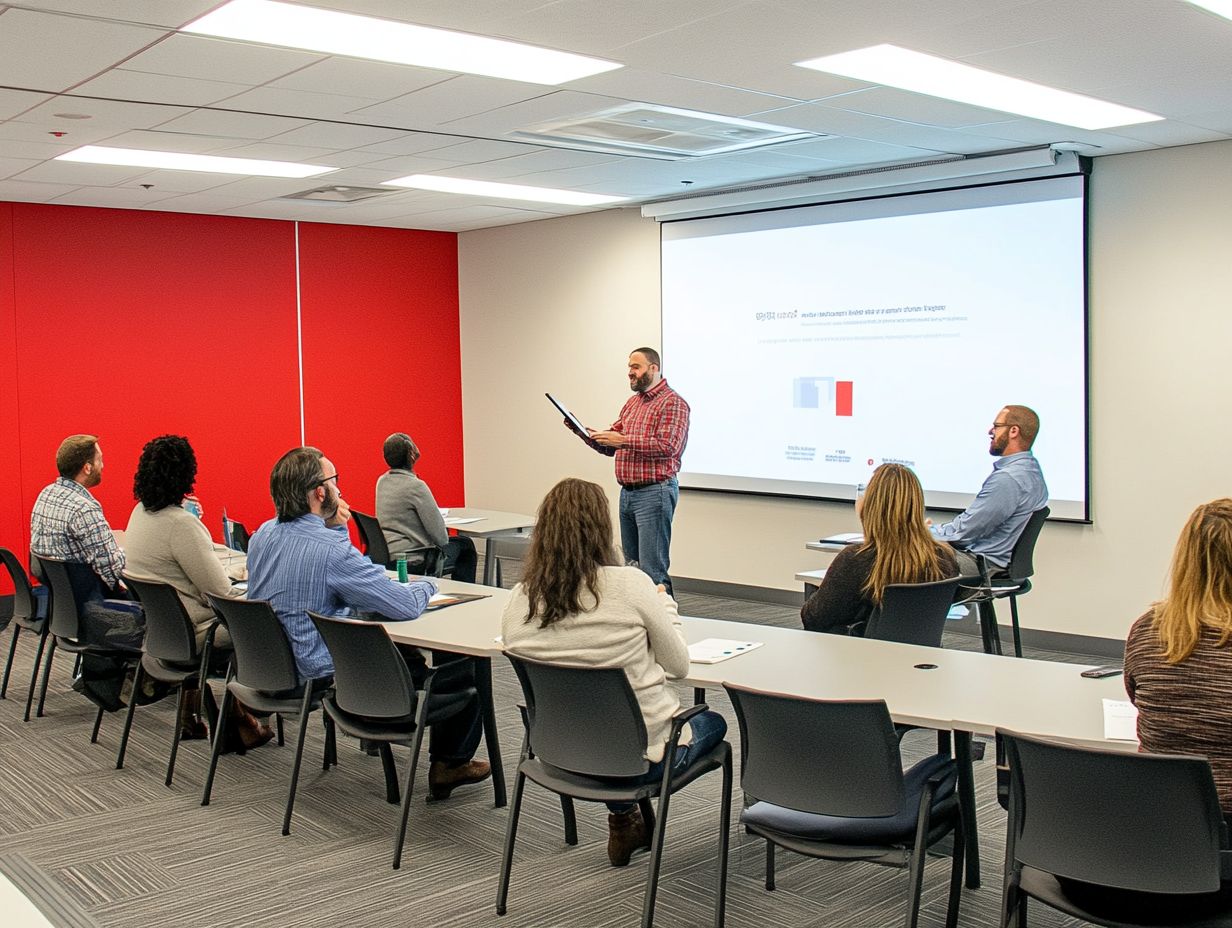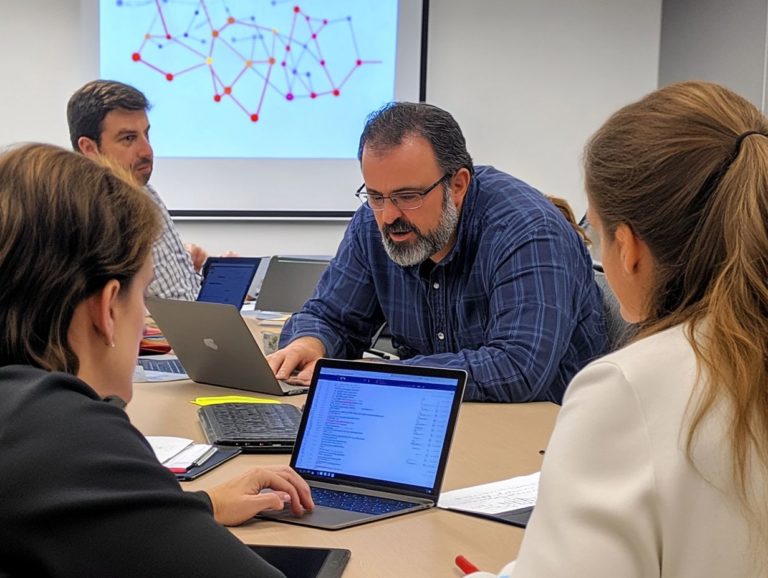What Role Do Managers Play in Employee Training?
In today s fast-paced business landscape, effective employee training is paramount for your organization’s success and your employees’ growth.
When you implement a well-structured training program, you ll discover that the benefits extend far beyond skill enhancement; they can significantly boost morale and invigorate the entire workplace.
As a manager, the responsibility for nurturing this development often falls on your shoulders. This article delves into your crucial role in employee training, providing insights on strategies to create and implement effective programs while underscoring the significance of ongoing education and professional development.
By investing in training, you pave the way for a more skilled and motivated workforce, transforming potential into performance.
Contents
- Key Takeaways:
- The Importance of Employee Training
- The Role of Managers in Employee Training
- Creating a Training Plan
- Implementing and Evaluating Training
- Continuing Education and Professional Development
- Frequently Asked Questions
- How do managers drive success in employee training?
- How do managers contribute to employee training?
- Why is it important for managers to be involved in employee training?
- What skills should managers possess to effectively oversee employee training?
- What steps should managers take to ensure effective employee training?
- Can managers also participate in employee training?
Key Takeaways:

- Managers play a crucial role in employee training by identifying training needs and developing effective training programs that benefit both the organization and employees.
- It is the responsibility of managers to implement and evaluate training, using effective techniques to ensure its success and continuously improve employee skills.
- Continuing education and professional development are important for ongoing growth and success, and managers should prioritize providing opportunities for employees to enhance their skills and knowledge.
The Importance of Employee Training
Employee training serves as a foundation for both your individual growth and the overall success of your organization. It fuels workforce productivity and ensures you’re equipped to thrive amidst the tough competition of today’s dynamic business landscape.
By investing in your development, your company not only sharpens your skills but also creates an environment of ongoing learning that sparks innovation and boosts engagement. Staying committed to training is key to hitting your targets and adapting to market challenges, highlighting the vital role that employee training plays at every level of the organization.
Benefits for Organizations and Employees
The benefits of employee training extend to both you and your organization, creating a win-win scenario that enhances your job satisfaction and overall productivity.
This approach not only boosts retention rates but also cultivates a culture of continuous improvement and growth. With targeted training programs, you sharpen your skills, giving the power to you in your current role while also preparing you for future opportunities. These development initiatives spark increased motivation, as you feel valued and invested in, leading to a more committed workforce.
As a result, this supportive learning environment encourages you to take ownership of your personal development, ultimately driving your career advancement and solidifying the organization’s reputation as a highly desirable workplace.
The Role of Managers in Employee Training
As a manager, you play a pivotal role in employee training, acting as a facilitator who guides training programs, fosters effective communication, and monitors performance to ensure that training objectives are met.
Your responsibilities extend beyond mere oversight; you implement innovative ideas that enhance skill development and align training initiatives with the organization s strategic goals. By actively engaging in coaching your employees and utilizing ways to gather employee input, you can significantly influence team dynamics and make a meaningful contribution to successful employee development.
Responsibilities and Strategies
Effective managers embrace a diverse range of responsibilities and strategies to elevate employee training. This ensures that both training objectives and organizational success are seamlessly achieved.
To accomplish this, they often implement ways to track performance that provide valuable insights into areas requiring improvement. This also facilitates tailored training plans. For example, you might analyze productivity metrics to pinpoint skills gaps. Then, allocate resources wisely for targeted training programs.
Employing motivational techniques such as recognition and reward systems can significantly enhance employee engagement. This ultimately boosts morale and productivity. Adopting a mentoring approach is crucial in nurturing personal and professional growth. Seasoned employees guide newcomers through challenges and share invaluable insights, fostering a culture of continuous improvement.
Creating a Training Plan

A great training plan can transform your team’s success! It is vital for maximizing the effectiveness of your employee development initiatives and ensuring that training objectives align seamlessly with your organizational goals.
A well-structured plan starts with identifying training needs. Assess the existing skill set of your employees and determine the resources required for successful implementation.
By addressing these critical elements, you can design tailored training programs that enhance personal development and boost overall productivity within your organization.
Identifying Training Needs
Identifying your training needs is a critical first step in crafting an effective training plan. It ensures that you focus on the most relevant skills for your employees growth.
This process goes beyond simply gathering data; it needs a clear strategy. Monitor performance to evaluate current skill levels, collect feedback directly from employees about their training experiences, and conduct thorough skill gap analyses to find missing skills in your team.
These assessment methods not only provide valuable insights into individual capabilities but also highlight collective weaknesses within the team. By aligning these identified needs with your organization s overarching goals, you foster a cohesive strategy that enhances overall employee skill development.
Ultimately, this drives productivity and success within the company. Start assessing your team s skills today to unlock their full potential!
Developing a Training Program
Developing a training program requires you to define the most engaging training methods and learning opportunities that effectively address the specific needs of your employees.
This process involves a thoughtful selection of delivery formats, such as online learning platforms, interactive workshops, and hands-on simulations. These formats should be tailored to accommodate various learning styles.
By incorporating innovative ideas like gamification or collaborative projects you can significantly boost motivation and participation among your team.
Measuring the effectiveness of these training initiatives is crucial. Employ pre- and post-training assessments, feedback surveys, and on-the-job performance metrics to yield valuable insights.
By analyzing this data, you can adapt your programs in real-time, ensuring they evolve alongside employee needs and foster a culture of continuous improvement.
Implementing and Evaluating Training
Successfully implementing and evaluating training programs is essential for ensuring that your employee development initiatives yield positive results. This contributes to organizational success.
This process goes beyond merely delivering the training; it requires establishing performance monitoring systems and feedback mechanisms that allow you to assess the effectiveness of these initiatives.
By analyzing the outcomes, you can make informed decisions regarding future training resources and strategies. This ultimately enhances your organization s growth and effectiveness.
Effective Implementation Techniques
Effective implementation techniques are crucial for maximizing training effectiveness and ensuring that you and your team remain engaged while applying newly acquired skills.
Coaching stands out as a powerful technique. It provides personalized support, enabling immediate feedback and tailored guidance. Leveraging online learning platforms offers you a flexible and accessible way to explore a wealth of resources at your own pace.
Incorporating hands-on learning activities, like group activities and interactive sessions, fosters collaboration and knowledge sharing. This approach creates a positive learning environment.
By blending these methods, organizations can craft a comprehensive training experience that not only equips you with essential skills but also inspires you to take an active role in your professional development.
Evaluating the Success of Training

Evaluating the success of your training is a crucial part of the process. It allows you to measure effectiveness and pinpoint areas for continuous improvement.
By utilizing various evaluation methods such as gathering feedback from trainees and analyzing performance data you gain invaluable insights. These assessments illuminate the immediate impact of the training and reveal how well the skills are retained and applied over time. Understanding how trainees perceive their experiences helps you uncover specific gaps in knowledge or skills.
As a result, these evaluations will guide your future training initiatives. This ensures they are customized to meet the evolving needs of your organization and enhances your overall training strategy.
Continuing Education and Professional Development
Continuing education and professional development are essential for cultivating a strong learning culture within your organization, empowering employees to thrive and adapt in their roles.
By investing in ongoing training initiatives, you not only boost employee motivation but also ensure their skills remain relevant in today s dynamic work environment.
Organizations that prioritize continuing education are in a much stronger position to retain top talent and sustain a competitive advantage in their industry.
The Importance of Ongoing Training
Ongoing training is vital for your skill development! It plays a key role in keeping employee engagement levels high within your organization.
This continuous learning journey empowers you to swiftly adapt to new tools and technologies, a necessity in today s fast-paced work environment. When a company regularly updates its workforce on the latest software and tools, it often sees remarkable increases in productivity. This demonstrates that when you feel equipped to tackle your tasks, your problem-solving abilities truly shine.
Creating a culture of knowledge sharing can ignite collaboration and drive innovation as team members exchange valuable insights and best practices. A prime example is a tech firm that introduced a mentorship program, leading to noticeable improvements in job performance linked to enhanced communication and skill development among its employees.
Frequently Asked Questions
How do managers drive success in employee training?
Managers play a crucial role in employee training as they are responsible for overseeing and facilitating the training process, which includes understanding what role trainers play in corporate training.
How do managers contribute to employee training?

Managers contribute to employee training by identifying training needs, creating training plans, and providing resources and support for employees.
Why is it important for managers to be involved in employee training?
It is important for managers to be involved in employee training as they have a direct impact on the success and development of their team members.
What skills should managers possess to effectively oversee employee training?
Managers should possess strong communication, coaching, and leadership skills in order to effectively oversee employee training.
What steps should managers take to ensure effective employee training?
To ensure your team is trained effectively, start by assessing their training needs! Training needs refer to the skills and knowledge employees must develop to perform their jobs effectively.
Next, create a targeted plan with essential resources and evaluate how well it works.
Can managers also participate in employee training?
Yes, managers can participate in training. This shows the importance of continuous learning and sets a strong example.





